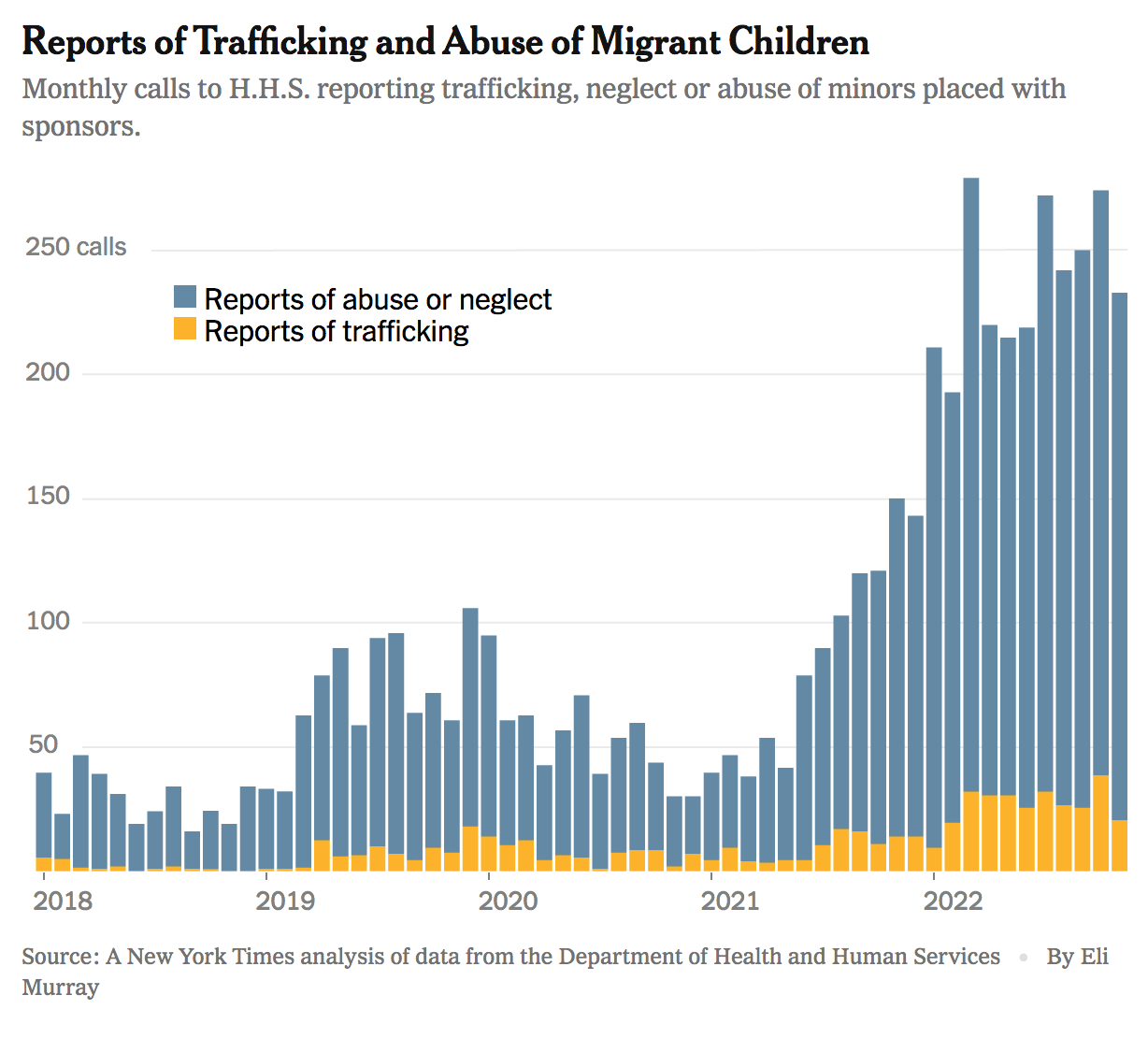NY Times: Migrant Children Being Abused, Trafficked After Release into U.S. Explodes Under Biden
Unaccompanied Alien Children (UACs) reported to federal officials for being subjected to abuse, neglect, or trafficking after their release into the United States has exploded under President Joe Biden's watch.
According to bombshell data from the Department of Health and Human Services (HHS), published in the New York Times, there has been an explosion in reports of abuse, neglect, and trafficking among UACs after they are released to sponsors in the U.S. — most of whom are not their relatives.
The data indicate that in the last few months of 2020, when former President Trump was in office, reports to HHS officials of abuse, neglect, and trafficking of UACs sat below just 50 calls.
By early 2021, when Biden took office and blew open an expansive Catch and Release network for migrants, reports to HHS officials of abuse, neglect, and trafficking of UACs went from fewer than 50 calls in January 2021 to well over 250 calls by March 2022 and averaging more than 200 calls a month since then.
During a House immigration hearing this week convened by Rep. Tom McClintock (R-CA), Center for Immigration Studies Director of Policy Jessica Vaughan said sponsors were effectively unvetted, as HHS is not a law enforcement agency and does not have the means to properly vet adults looking to take in UACs.
“According to HHS and numerous outside observers, the sponsors who come forward to take custody of these minors receive little meaningful vetting,” Vaughan wrote in her written testimony:
They typically are subject to a biographical name check for criminal records, but are fingerprinted only if staff are able to articulate a reason why the placement might be a problem, not to discover information that might suggest a risk. Similarly, home studies to evaluate the environment to which the minor will be released or the sponsor's credibility or financial stability are done only in very rare cases, such as with child trafficking victims they have discovered; very young (under 12 years), disabled or abused children; or if a sponsor has volunteered to take in multiple kids. Contrary to best practices, other adults in the sponsoring household are not routinely subject to fingerprinting or investigation. [Emphasis added]
Likewise, there is no meaningful monitoring” of UACs once they are placed with a sponsor, Vaughan said.
“They are not required to accept post-release services, and in many cases, the sponsors have blocked case workers from contact with the minors,” she continued. “In fact, the government usually loses track of the minors after release, either because the minors and their sponsors refuse to communicate, the youth moves to another household, drops out of school and services, and skips out on immigration hearings.”
In February, for instance, reports indicated that HHS had lost track of more than 85,000 UACs after they were turned over to sponsors living throughout the U.S. Department of Homeland Security (DHS) officials have seemingly admitted that many of those lost UACs have ended up in a labor trafficking pipeline.
A month later, HHS Secretary Xavier Becerra said he had “no idea” whether HHS had lost track of 85,000 UACs in the U.S.
John Binder is a reporter for Breitbart News. Email him at [email protected]. Follow him on Twitter here.
This “Eyes on Trafficking” story is reprinted from its original online location.
Fair Use Notice: The PBJ Learning Knowledge Vault is dedicated to advancing understanding of various social justice issues, including human trafficking and related topics. Some of the material presented on this website may contain copyrighted material, the use of which has not always been specifically authorized by the copyright owner. We are making such material available in our efforts to promote education and awareness of these important issues. There is no other central database we are aware of, so we put this together for both historical and research purposes. Articles are categorized and tagged for ease of use. We believe that this constitutes a ‘fair use' of any such copyrighted material as provided for in section 107 of the US Copyright Law. In accordance with Title 17 U.S.C. Section 107, the material on this site is distributed without profit to those who have expressed a prior interest in receiving the included information for research and educational purposes. For more information on fair use, please visit: “17 U.S. Code § 107 – Limitations on exclusive rights” on Cornell Law School's Legal Information Institute.
 ABOUT PBJ LEARNING
ABOUT PBJ LEARNING
PBJ Learning is a leading provider of online human trafficking training, focusing on awareness and prevention education. Their interactive Human Trafficking Essentials online course is used worldwide to educate professionals and individuals how to recognize human trafficking and how to respond to potential victims. Learn on any web browser (even your mobile phone) at any time.
More stories like this can be found in your PBJ Learning Knowledge Vault.
This “Eyes on Trafficking” story is reprinted from its original online location.
ABOUT PBJ LEARNING
PBJ Learning is a leading provider of online human trafficking training, focusing on awareness and prevention education. Their interactive Human Trafficking Essentials online course is used worldwide to educate professionals and individuals how to recognize human trafficking and how to respond to potential victims. Learn on any web browser (even your mobile phone) at any time.
More stories like this can be found in your PBJ Learning Knowledge Vault.

